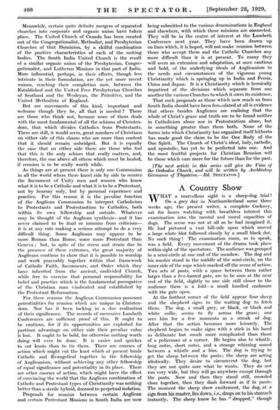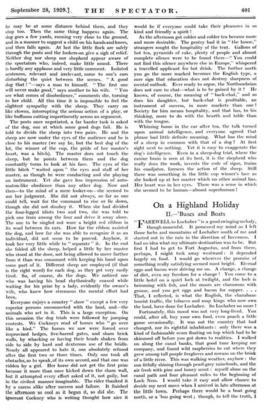A Country Show
WHAT a marvellous sight is a sheep-dog :trial ! On a grey day in Northumberland some three weeks ago, the present writer, a complete Cockney, sat for hours watching with breathless interest this examination into the mental and moral capacities of dogs. The scene was not at all as he had imagined it. He had pictured a vast hill-side upon which moved a large white blot followed closely by a small black dot. No such thing ! The examination room, so to speak, was a field. Every movement of the drama took place within sight of the spectators. The audience was grouped in a semi-circle at one end of the meadow. The dog and his master stood in the middle of the semi-circle, on the inner side of the rope which marked off the scene of action. Two sets of posts, with a space between them rather larger than a five-barred gate, are to be seen at the near end of the field, slightly to one side still closer to the audience there is a fold—a small hurdled enclosure with the gate open.
At the farthest corner of the field appear four sheep and the shepherd signs to the waiting dog to fetch them. The dog, a small grey, or black, or black and white collie, seems to fly across the grass ; one sees him for a few moments as a streak of dog. After that the action becomes more leisurely. The shepherd begins to make signs with a stick in his hand as deliberate but much more complicated than those of a policeman at a corner. He begins also to whistle, long notes, short notes, and a strange whizzing sound between a whistle and a hiss. The dog is trying to get the sheep between the posts ; the sheep are acting idiotically. They desire to circumvent the dog, but they are not quite sure what he wants. They do not run very wide, but they will go anywhere except through the posts. Now and then- they stand still, crowded close together, then they dash forward as if in panic. The moment the sheep show excitement, the dog, at a sign from his master, lies down, i.e., drops on to his stomach instantly. The sheep know he has • " dropped," though he may be at some distance behind them, and they stop too. Then the same thing happens again. The dog goes a few yards, running very close to the ground, and in a manner to suggest a child on his hands and knees, and then falls again. At last the little flock are safely through the posts and the lookers-on give a sigh of relief. Neither dog nor sheep nor shepherd appear aware of the spectators who, indeed, make little sound. There is hardly any applause and very little comment. Isolated sentences, relevant and irrelevant, come to one's ears disturbing the quiet between the scenes. " A good dog that ! "—says a man to himself. " The first one will never make good," says another to his wife. " You see what comes of disobedience," comments she, turning to her child. All this time it is impossible to feel the slightest sympathy with the sheep. They carry on like clowns, interrupting the serious action of a play, or like buffoons cutting impertinently across an argument.
The posts once negotiated, a far harder task is asked of the dog,- one at which some good dogs fail. He is told to divide the sheep into two pairs. He and the sheep are now under the eyes of the audience and he is close' to his master (we say he, but the best dog of the lot, the winner of the cup, the pride of her master's heart, was a bitch). The master does not touch the sheep, but he points between them and the dog constantly turns to look at his face. The eyes of the little bitch " waited upon " the eyes and staff of her master, as though he were conducting and she playing an instrument. Yet she gave less impression of auto- maton-like obedience than any other dog. Now and then—to the mind of a mere looker-on—she seemed to use her judgment. She did not always, so far as one could tell, wait for the command to rise or lie down, though she did not disobey it. When she had divided the four-legged idiots two and two, she was told to pick one from among the four and drive it away alone. The one to be singled out wore a bright red ribbon in its wool between its ears. How far the ribbon assisted the dog, and how far she was able to recognize it as an individual, did not seem to be proved. Anyhow, it took her very little while to " separate " it. In the end she folded all the sheep, helped a little by her master who stood at the door, not being allowed to move further from it than was consonant with keeping his hand upon some part of it. Different sheep are employed (if that is the right word) for each dog, as they get very easily tired. So, of course, do the dogs. We noticed one who was having his head rhythmically coaxed while waiting for his prize by a lady, evidently the owner's wife, who knew how strenuous the mental effort had been.
Everyone enjoys a country " show " except a few very superior persons unconnected with the land, and—the animals who act in it. This is a large exception. On this occasion the dog trials were followed by jumping contests. We Cockneys read of horses who " go over like a bird." The horses we saw were forced over improvised hedges, five-barred gates, and sham brick walls, by whacking or having their heads shaken from side to side by hard and dexterous use of the bridle. Nearly all appeared to hate it, one absolutely refused after the first two or three times. Only one took all obstacles, so to speak, of its own accord, and that one was ridden by a girl. Her horse did not get the first prize because it more than once kicked down the sham wall, but it attempted every effort asked of it, not gaily, but in the civilest manner imaginable. The rider thanked it by a caress alike after success and failure. It finished the 'afternoon. as cool as it began it, so did she. The ignorant Cockney who is writing thought how nice it would be if everyone could take their pleasures in so kind and friendly a spirit !
As the afternoon got colder and colder tea became more and more desirable. The gentry had it in " the house," strangers sought the hospitality of the tent. Gallons of hot tea, pyramids of cake, plenty of people and almost complete silence were to be found there—" You could not find this silence anywhere else in Europe," whispered a travelled applicant for hot drink. The further north you go the more marked becomes the English type, a sure sign that education does not destroy sharpness of mental outlook. Ever ready to argue, the Northumbrian does not care to chat—what is to be gained by it ? He knows, of course, the meaning of " back-chat," and so does his daughter, but back-chat is profitable, an instrument of success, in more markets than one ! Society for him means hospitality, and that has, to his thinking, more to do with the hearth and table than with the tongue.
Whizzing home in the car after tea, the talk turned upon animal -intelligence, and everyone agreed that phrase had little definite meaning. What has the mind of a sheep in common with that of a dog ? At first sight next to nothing. Yet it is easy to exaggerate the dog's intelligence. Even in a sheep-dog trial, where the Canine brain is seen at its best, it is the shepherd who really does the work, invents the code of signs, trains his coadjutor, foresees the action of the sheep. Still there was something in the little cup winner's face as she looked up at her master which no other animal has. Her heart was in her eyes. There was a sense in which she seemed to be human—almost superhuman !



































 Previous page
Previous page